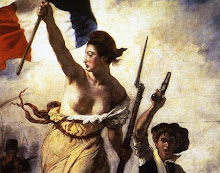From The Economist print edition
A landmark extradition sees Alberto Fujimori facing justice
 FOR much of his decade as president between 1990 and 2000, Peruvians saw Alberto Fujimori as a saviour. He conquered the hyperinflation bequeathed by his predecessor, Alan García, and restored growth. With Vladimiro Montesinos, his shadowy intelligence chief, he crushed the Maoist terrorists of the Shining Path and locked up their leader, Abimael Guzmán. Now the saviour has joined Messrs Montesinos and Guzmán behind bars.
FOR much of his decade as president between 1990 and 2000, Peruvians saw Alberto Fujimori as a saviour. He conquered the hyperinflation bequeathed by his predecessor, Alan García, and restored growth. With Vladimiro Montesinos, his shadowy intelligence chief, he crushed the Maoist terrorists of the Shining Path and locked up their leader, Abimael Guzmán. Now the saviour has joined Messrs Montesinos and Guzmán behind bars.
There was always a dark side to Mr Fujimori. Though twice freely elected, he shut down his country's Congress in 1992 and used other strong-arm methods. He fled to Japan in 2000 after trying fraudulently to win a third, unconstitutional term. In November 2005 he flew to Chile, in an apparent bid to slip back into Peru and rally his supporters for last year's presidential election. There he was arrested at the Peruvian government's request.
In a decision hailed by human-rights campaigners, Chile's Supreme Court ruled on September 21st that Mr Fujimori should be extradited to Peru to face seven sets of charges. These include complicity in the actions of the Colina Group, an army death squad that killed 25 civilians in two separate incidents (one of them involved the slaughter of those attending a barbecue which the intelligence service believed was to raise funds for Shining Path). Most of the charges relate to corruption: the most sinister feature of Mr Fujimori's rule was the unlimited power granted to Mr Montesinos to bribe and extort on a scale that prosecutors say topped $1 billion.
>Mr Fujimori claims not to have known the doings of his spy chief. But Mr Montesinos, who has already been found guilty on several charges and is serving a 20-year jail sentence, will be a key figure in his trials. Mr Montesinos and several members of the army are still being tried for the actions of the Colina group.
The Fujimori case had the potential to strain Peru's relations with Chile, which while much improved are easily inflamed by hurt from defeat in 19th-century wars. But Chile's Supreme Court stuck to the letter of the country's law. In approving extradition while rejecting six of the charges, it mainly based itself on Chile's own penal code rather than on international norms.
Nevertheless, some lawyers see the verdict as a wider turning point. The court followed the ruling of Britain's House of Lords in the case of Chile's former dictator, Augusto Pinochet, in dismissing defence arguments that Mr Fujimori, as a former head of state, enjoyed immunity from criminal prosecution.
José Miguel Vivanco of Human Rights Watch, a New York-based group, points out that the Fujimori case marks the first time that a court has extradited a former head of state for trial in his own country, rather than by an international tribunal. In doing so, Chile's Supreme Court, one of the more formalistic and conservative in Latin America, has up-ended the region's long tradition of granting political asylum to former rulers. Under that tradition, Panama shelters several disgraced presidents, including Haiti's Raoul Cédras.
Another former Haitian dictator, Jean-Claude Duvalier, this week asked forgiveness of his country. Mr Duvalier, in exile in France since 1986, is believed to want to return home after running out of money. But the country's president, René Préval, said his government would press ahead with efforts to recover money he believed was stolen during Mr Duvalier's rule.
Mr Fujimori's case will be a test for Peru's judges and for Mr García who, in an irony of history, is again its president. The judiciary was undermined when Mr Fujimori appointed pliant judges in the 1990s. It has since taken steps towards greater professionalism. The defendant enjoys certain privileges: as a former head of state, he will be tried by the Supreme Court, and under international law he can be tried only for those matters on which the Chilean judges approved his extradition.
In 1992 Mr García himself sought asylum in Colombia, fearing corruption charges from Mr Fujimori (they were eventually dropped). Since winning last year's election, having campaigned as a free-marketeer, he has relied for a legislative majority on the backing of Mr Fujimori's supporters. They are now led by Mr Fujimori's daughter, Keiko, who won 603,000 votes in Lima, three times more than any other congressional candidate.
That alliance is now under strain. Mr Fujimori is being held at a police base, rather than under house arrest as he hoped. Mr García says his former adversary's fate should be decided strictly according to the law. Ms Fujimori, who is likely to run for the presidency in 2011, calls her father the victim of a vendetta.
In trying to return to Peru, Mr Fujimori seemed to hope that he would again be greeted as a saviour. But Peru has moved on: in polls, a majority say they would never vote for him. Ms Fujimori has some of her father's political talents, and Peru's politics is notoriously unpredictable. But rather than the return to the presidential palace he dreamed of, it may be Mr Fujimori's fate to join Mr Montesinos and Mr Guzmán in the high-security jail he himself ordered built in a naval fortress.

No hay comentarios:
Publicar un comentario